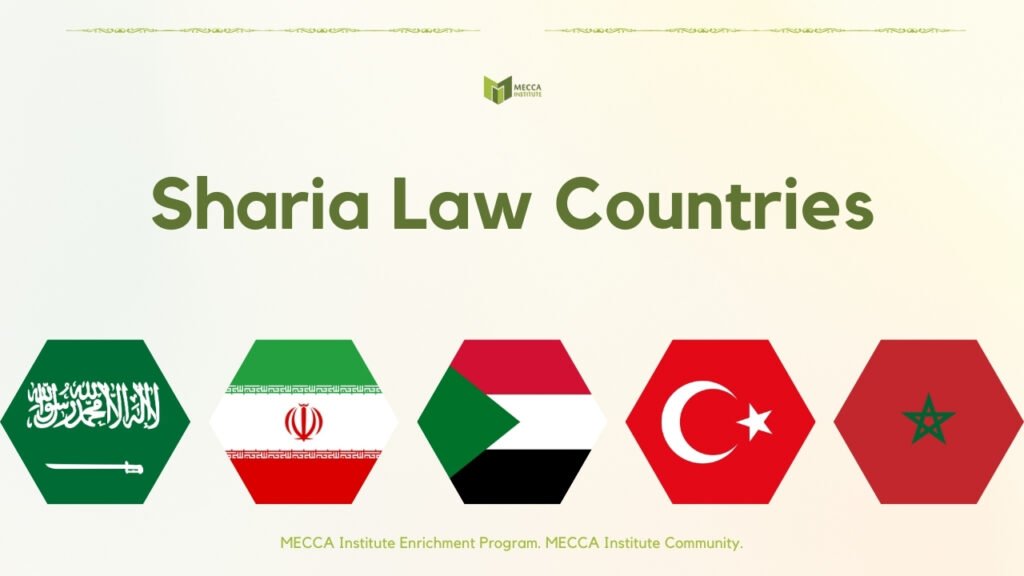Sharia law countries differ, says Imam Daayiee Abdullah, highlighting the importance of knowing where you are going.
Although Muslims share the 5 Pillars of Islam across multiple continents, not all of them share the same laws. Muslim denominations are diverse.
My first time in Saudi Arabia was a stark difference to my experiences in nearby Egypt. When I would walk down the streets of Cairo, music would be blaring from the homes.
In Saudi Arabia, if you had to listen to music, you had to do it discreetly. You would have your volume lowered and individuals would use headphones.
Yet, both of them use laws according to their madhabs (School of Thought). Even though they are both Sunni, the Hanbali denomination in Saudi Arabia is much stricter than Maliki one that is popular in Egypt.
Therefore, in this article I will describe the nuanced differences you will find in various Sharia law countries. I will make sure to include both Saudi Arabia and Egypt.
Sharia Law Countries

Sharia law implementation takes form in various ways across different countries. In some, it is strictly applied, while in others, its application is more selective.
Countries that apply Sharia law strictly include Saudi Arabia, Iran, Sudan, and Afghanistan. Sunni and Shia countries like Saudi Arabia (Sunni) and Iran (Shia) tend to also have stark differences in their approaches. What they all have in common is that Sharia is the supreme law.
On the other hand, some countries apply Sharia law more selectively. For example, in Egypt, Turkey, and Morocco, Sharia law is in use as a primary source of law. In Indonesia, Sharia law applies to criminal matters in the Aceh province. Countries like Jordan and Bangladesh apply Sharia law in specific areas such as inheritance, marriage, divorce, and alimony. In Bangladesh, it also governs property inheritance for Muslims.
Other nations where Sharia law plays a role, though not always strictly enforced, include Iraq, Syria, Nigeria, Algeria, Malaysia, the Philippines (in the BARMM region), and Mali.
In other words, the degree to which Sharia law influences the legal system varies greatly from one country to another. Typically, it ranges from being the primary source of law to being applied only in specific areas like family law or regional governance.
Strict Muslim Countries
Yes, even the Islamic calendar is part of Sharia. That is, some Sharia law countries countries enforce rules strictly across all aspects of life, while others apply it selectively in personal or family matters, and some implement it regionally, often alongside secular legal systems.
Countries like Saudi Arabia, Iran, Sudan, and Afghanistan impose an extreme version of Sharia law. In Saudi Arabia, for example, Sharia governs all aspects of life, whereas Iran combines Shia Islamic law with civil law, enforcing strict social codes.
On the other hand, countries like Egypt, Turkey, Morocco, Jordan, Indonesia, and Bangladesh apply Sharia law selectively. Egypt and Turkey use Sharia mainly in family law, while Morocco applies it to family matters alongside civil law.
In Jordan, Sharia governs inheritance and family law, while secular laws handle other areas, and Bangladesh regulates marriage, divorce, and inheritance for Muslims.
And, of course, in Iraq, Syria, Nigeria, Algeria, Mali, Indonesia, Malaysia, and the Philippines (BARMM), Sharia law is implemented selectively or regionally. For example, Nigeria’s northern states and the Philippines’ Bangsamoro region apply Sharia but rely on secular law elsewhere.
So, if you plan to visit any of these countries, know the degree to which you may have to deal with Sharia law.
Prohibitions in Sharia Law Countries
Did you know that some Muslim countries regulate activities during Ramadan? Not all Muslims are the same, but Sharia law countries have significant things in common. For example, prohibitions in these countries cover a wide ranging areas of life.
In extreme strict Muslim countries, there are major prohibitions that focus heavily on dress codes, public behavior, and women’s rights. Women are required to adhere to strict dress codes, such as wearing the hijab (covering), and may not be allowed to travel or work without a male guardian.
Public displays of affection, alcohol consumption, and other “un-Islamic” behaviors may result in harsh punishments. Expect flogging, amputation, or even execution.
Unfortunately, women’s freedom is severely restricted, including limited participation in public life, and violations of religious laws can lead to severe penalties, including death or public punishment like stoning.
In strictly applied Muslim countries, the prohibitions tend to center around family law, personal conduct, and religious observance. Sharia law governs personal matters such as marriage, divorce, inheritance, and child custody, often with limited recourse to secular law.
In somewhat strict Muslim countries, Sharia law is applied in a more limited or regional manner, with prohibitions focused primarily on personal matters. Family law, including issues like marriage, divorce, and inheritance, is typically governed by Sharia for Muslims.
In other words, the prohibitions are diverse, depending on the level of Sharia strictness a particular country follows.
Sharia Law Punishments

Sharia law punishments are naturally a part of life in Sharia law countries. They range from severe corporal punishments and execution in the strictest countries to fines, imprisonment, or warnings in more moderately applied regions.
Regardless of where you are, there is a focus on personal behavior and religious observance.
In extreme strict Muslim countries, Sharia law punishments are severe. For example, there are executions for offenses like repeated theft, apostasy, or adultery. Women may face harsh penalties for violations of dress codes or behavior (family honor, for example), with extreme cases including trumpted up charges that lead to stoning for adultery or blasphemy.
The legal system is rigid in these countries, and punishments are usually publicly carried out as a deterrent. It adds insult to injury by leaving the victim with humiliation in their final moments of life.
In strictly applied Muslim countries, punishments are still based on Sharia but are generally less severe and more focused on personal matters. Offenses like alcohol consumption, theft, or blasphemy may lead to fines, imprisonment, or flogging.
In most of these countries, punishments are often confined to specific behaviors, with secular courts handling most legal matters. That said, adherence to religious practices like prayer and fasting during Ramadan is mandatory, and failure to comply may result in legal consequences, though less extreme than in the most stringent nations.
In somewhat strict Muslim countries, Sharia punishments are applied regionally and are typically less severe. Violations of personal matters like marriage, divorce, and inheritance may result in fines or dispute resolution through Islamic courts.
So, be aware of these differences if you are planning to visit a country that uses Sharia.
Visiting Muslim-Majority Country
If you plan to visit a Muslim-majority country, make sure to know ahead of time if this is part of the Sharia law countries.
Regardless, be mindful of local customs and laws influenced by Sharia. This is especially regarding dress codes, alcohol consumption, and public behavior.
Women may need to dress modestly, covering arms and legs, and avoid public displays of affection. Definitely cover if you plan to visit a mosque.
Meanwhile, in the month of fasting, Ramadan, avoid eating, drinking, or smoking in public during daylight hours.
Also respect religious practices like prayer times, and be cautious about discussing sensitive topics such as religion or politics.
Finally, always check local laws to stay informed. Your country of origin should be able to give you information about places you visit.
May Allah continue to bless us all.
Imam Daayiee Abdullah is the Executive Director of MECCA Institute and the author of “Progressive Islam,” a historic book that defines Progressive Islam.

